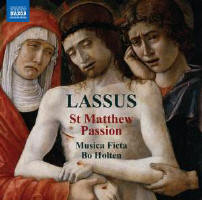Texte paru dans: / Appeared in: |
|
|
Reviewer: J.
F. Weber
If you looked closely at the
headnote, you may have suspected a typo in the timing. I have come across
several CDs that play a little over 82 minutes, but this single disc is
fully six minutes longer than that. The main work runs about an hour in a
complete performance, as Paul Hillier’s was (Fanfare 18:1). The mono LP
version by Hans Grischkat omitted a few verses at the end, playing two
minutes shorter. The recent Jeffrey Skidmore version (35:4) omitted a few
more verses, several more minutes shorter. Five motets, a single madrigal
from Lagrime di San Pietro, and two unidentified Agnus Dei movements are
sprinkled through the Passion. Only one of these replaces the Passion
setting of the words of Jesus, Tristis est anima mea; the others are more
like the arias and chorales that Bach inserted into his Passions, the final
Agnus Dei fittingly concluding the entire performance. The madrigal fits in
less well than the others.
Even so, this is a splendidly
restrained and complete performance, offering arguably better fillers than
Hillier and Skidmore and eclipsing the latter’s incomplete text. Torsten
Nielsen is a superb Evangelist, while Lauritz Jakob Thomsen is a sensitive
voice of Jesus, but both are high baritones, missing the usual contrast
between a tenor Evangelist and a bass voice for Jesus. Six voices serve as
the chorus, smaller than Hillier’s Theatre of Voices or Skidmore’s Ex
Cathedra. Tempos are remarkably uniform across the four recordings.
Two of the five motets are
first recordings, Animam meam dilectam and Mors tua mors Christi. I know
that only because I just finished compiling a discography of the sacred
music of Lassus on plainsong.org.uk/publications/discographies-by-jerome-f-weber/.
The most revealing aspect of the discography is in the motets, since about
530 published motets are attributed to him. Only 300 of them have ever been
recorded, half of them only once. (I mixed in with them about 20 antiphons,
hymns, and sequences that are not strictly classed as motets, but one
alphabetical list is easier to search.) Listening to the three CD versions reveals not a lot of difference in overall effect, and no one need be unhappy with any of them. For a new purchaser, the latest version is an excellent choice. | |
|
|
|
|
|
|
|
Cliquez l'un ou l'autre
bouton pour découvrir bien d'autres critiques de CD |
|




